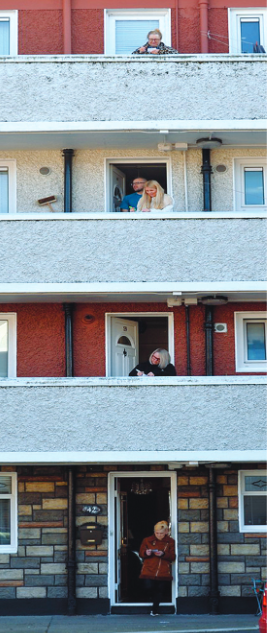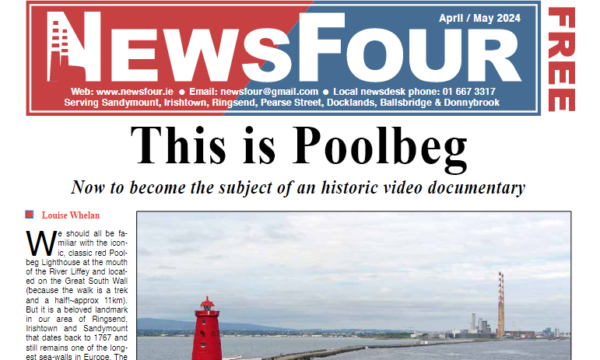
David Prendeville
As Ireland prepares to reopen we ask, what have we learned from the pandemic, and will the “new normal” be a blessing or a bane?
At long last, it looks like we may, hopefully, be emerging from the worst of this exhausting, decimating pandemic. A reasonably large number of people have now received at least their first dose of the vaccine. Non-essential shops have reopened, people can meet friends outdoors or in private gardens, hairdressers and beauty salons are back in business, while people are allowed to travel anywhere in the country. Hotels are set to reopen on June 2nd (as NewsFour hits the shops); while cinemas along with outdoor pubs and restaurants are set to open on June 7th. As we slowly crawl towards the light at the end of this infinite, despairing tunnel, now is an appropriate time to look back on the last fifteen months and consider how we got through the pandemic, what we may have learned from it and ponder what changes can we see being carried over into a post-pandemic world.
The most obvious place to start when considering this country’s reaction to the pandemic, is to assess how our government managed the crisis. It would be fair to say, they did not manage it very well. While some people viewed Ireland’s initial reaction under Leo Varadkar’s lame-duck Fine Gael government rather favourably, people’s patience wore thin at the raft of mixed messages, distraction tactics, leaks and botched reopenings that coloured the bleak winter under Micheál Martin as Taoiseach in this desperately unpopular Fianna Fail/Fine Gael coalition. Now that we appear to be emerging from the darkness there may be a tendency to exonerate the mistakes made by those in power. While mistakes are inevitable in unprecedented territory such as a global pandemic, it is imperative that the under-hand and often rather cowardly handling of the crisis by those in charge should be remembered.
From leaking stories about restrictions late at night, to Micheál Martin incredulously calling out a small bar in Dublin in a national broadcast because of a short video leaked on social media, to carpet-brushing of issues surrounding meat factories, housing, the spread of the virus in schools and foreign travel; this government’s engagement and discourse with its people throughout the crisis has been rather spineless. Indeed, the confusing mixed messaging has carried over into our recent emergence from lockdown. On the one hand, people are being encouraged to socialise outdoors, but then on the other, Dublin City Council close the Portobello Harbour, a hotspot for outdoor socialising due to “anti-social” behaviour. While it remains uncertain as to what the exact anti-social behaviour in question was, one suspects it may have had something to do with the chronic lack of amenities such as public toilets in Dublin City. The Vintners Association had a fair point when they recently suggested that the government should allow outdoor pubs to open up immediately as opposed to June 7th. Many of the bars across the city are already serving takeaway pints, but as it is, with them unable to provide their customers with seating, it means there’s a massive, unregulatable spill on to the streets and – a recurrent theme – no bathroom facilities for customers to use.
Confusion, contradiction and obfuscation are just some of the words that come to mind when considering some of the rules put forward by the Powers That Be during the pandemic. Sticking with pubs for a moment, the distinguishing of “wet” pubs from restaurant pubs and the insistence on customers buying a meal to go along with their drinks last summer, are other examples of some of the truly baffling regulations that were put forward. In contrast to the governing bodies, however, the people’s reaction to the pandemic has, by and large, been superb.
People have coped admirably in the face of the pandemic. The proliferation of Zoom meetings was the first and most prominent reaction to avert the loneliness faced at not being able to see loved ones, but all over you can see remarkable ingenuity in how people coped, including the advent of balcony bingo locally. People have also largely been very compliant with restrictions, even amid the hamfisted dialogues of those in charge. The pandemic has also served to highlight the fact that many people can work from home just as effectively as in the office. One suspects of all the changes society has gone through in the last year and a bit, that one may be the most long-lasting. That, in turn, could lead to an exodus from the cities, which could also have interesting knock-on effects on housing and other matters. Another likely long-term effect of Covid will be that people should be much less inclined to go to work while ill, as they may have done in the past. Masks are another thing that are likely to be around at least for the short to medium term future. It may be something that people adopt, out of choice, long-term when in crowded spaces, but it will probably (all going well), not be mandatory in the long run.
One of the knock-on effects of the pandemic has been the further move of social acts into the digital sphere. On an existential level, it will be interesting to see if that trend carries on post covid. Online dating was popular prior to the pandemic, but will it remain the prime option for single people to meet new people when pubs and clubs reopen? Maybe it had been heading in that direction anyway, but the pandemic certainly cemented its position in modern society. Similarly in entertainment, while cinemas have been decimated, streaming platforms have thrived. Again, while sites such as Netflix had been becoming increasingly powerful in the pre-pandemic time, Covid has further strengthened the hand of streaming platforms and raised further doubts about the future of cinema. It’s not only giants like Netflix that have thrived, but also boutique streaming services such as Mubi have seen a big increase in popularity during the pandemic. While, hopefully, there will always be enough cinephiles to ensure cinemas don’t disappear, the pandemic will likely further alter the way the masses consume their media, and furthermore heighten the relevance of streaming as a means of distribution.
On a more serious note, Covid-19 has highlighted the need for structural reform across various aspects of Irish society. Drastic improvements need to be made to Ireland’s health system, not least in terms of capacity. The devastation that the pandemic wrought in care homes also points to the need for structural reform there, in terms of infection protection, control measures and funding. It remains to be seen the long-term effects the pandemic will have on mental health in Ireland. It is imperative that funds are put into mental health services, as we move into the post-pandemic landscape. Studies in other countries have shown that impact on both health and socioeconomics is more keenly felt in deprived areas and those from lower income backgrounds. This points to the need for major reform in working and housing conditions going forward, if we are to learn anything from the devastation caused by this pandemic.
The long-term economic landscape remains uncertain. One of the most pertinent things that remains to be seen is how businesses and industries that were decimated by the pandemic, cope in its aftermath. Will pubs and nightclubs be able to flourish in the same way as before or will there be changes in people’s etiquette and attitudes in such places? And if so, how long will it take for people to be comfortable in them again? The ramifications for foreign travel is another uncertainty at this early point. There have been murmurs of its return in late summer or August. Whenever, it is unlikely we will ever see a return to the days of cheap flights seen before the pandemic. This, in turn, leads us on to a question not just for Ireland but for the world at large, that of the climate crisis. Will this pandemic be a catalyst for the type of major reform needed to avert the environmental catastrophe awaiting us? Will the Covid-19 pandemic be remembered by us as a terrible period and the greatest global catastrophe that we experienced in our lifetimes? Or will it be looked back upon as something we didn’t learn our lesson from and merely an omen of greater devastation to come?
The fact that the EU continues to block the plea from India for patent waivers for Covid-19 vaccines, sadly, suggests that the interests of capital still outweigh any notions of humanity, empathy or decency – even in the time of a crisis like a global pandemic. This doesn’t bode well for the future or the right lessons being learned. For now though, as individuals, we must see this as a time for cautious hope. There are still many obstacles in our way before we return to something close to normality, or the dreaded, overused cliche of a ‘new normal’. However, if we can’t cling on to hope when, in the darkest of tunnels we see some flickers of light in the distance, then when can we?



